5 Litigation Management Software Options For Busy Teams
5 Litigation Management Software Options For Busy Teams
Legal work isn’t always spent in courtrooms or client meetings. A surprising amount of time goes to chasing down documents, reformatting drafts, or juggling deadlines across tools that don’t talk to each other.
According to Clio’s Legal Trends Report, lawyers bill just 2.9 hours out of an 8-hour day on average. That’s only 37% of the workday spent on billable tasks—an efficiency gap that adds up fast.
Some of that is inevitable. But a lot comes down to how legal teams manage the day-to-day of litigation. Without the right systems in place, it’s easy to lose valuable time on process instead of progress.
In this guide, we break down the tools built to change that. From discovery automation to centralized case tracking, these litigation management software platforms help legal teams stay organized, meet deadlines, and spend more time on the work that actually matters.
What is Litigation Management Software?
Litigation management software covers a broad category of tools built to help legal teams stay organized during litigation. Some focus on tracking deadlines and filings. Others specialize in automating routine tasks or generating discovery documents.
Depending on the tool, it might support civil litigation cases, internal legal teams, or full-service firms handling dozens of matters at once.
What they all have in common is the goal: making litigation case management less chaotic and more controlled.
Here’s what these tools often include:
- Calendaring for key litigation events and deadlines
- Centralized document and evidence storage
- Progress tracking and task management
- Discovery drafting or automation features
Depending on the needs of your legal team, you might use a tool that handles the entire litigation process or one that focuses on a specific phase like discovery or case tracking. Each type is designed to make legal work more manageable and efficient.
Best Software For Litigation Management
Not sure where to start? We’ve compiled tools that support various aspects of litigation, so you can find the right fit for how your team works.
1. Briefpoint
Briefpoint is a specialized tool designed to help legal professionals reclaim valuable time during the most tedious parts of the litigation process.
Built for busy law firms, it focuses on automating the discovery process—drafting interrogatories, RFAs, and RFPs in a fraction of the time it would take manually.
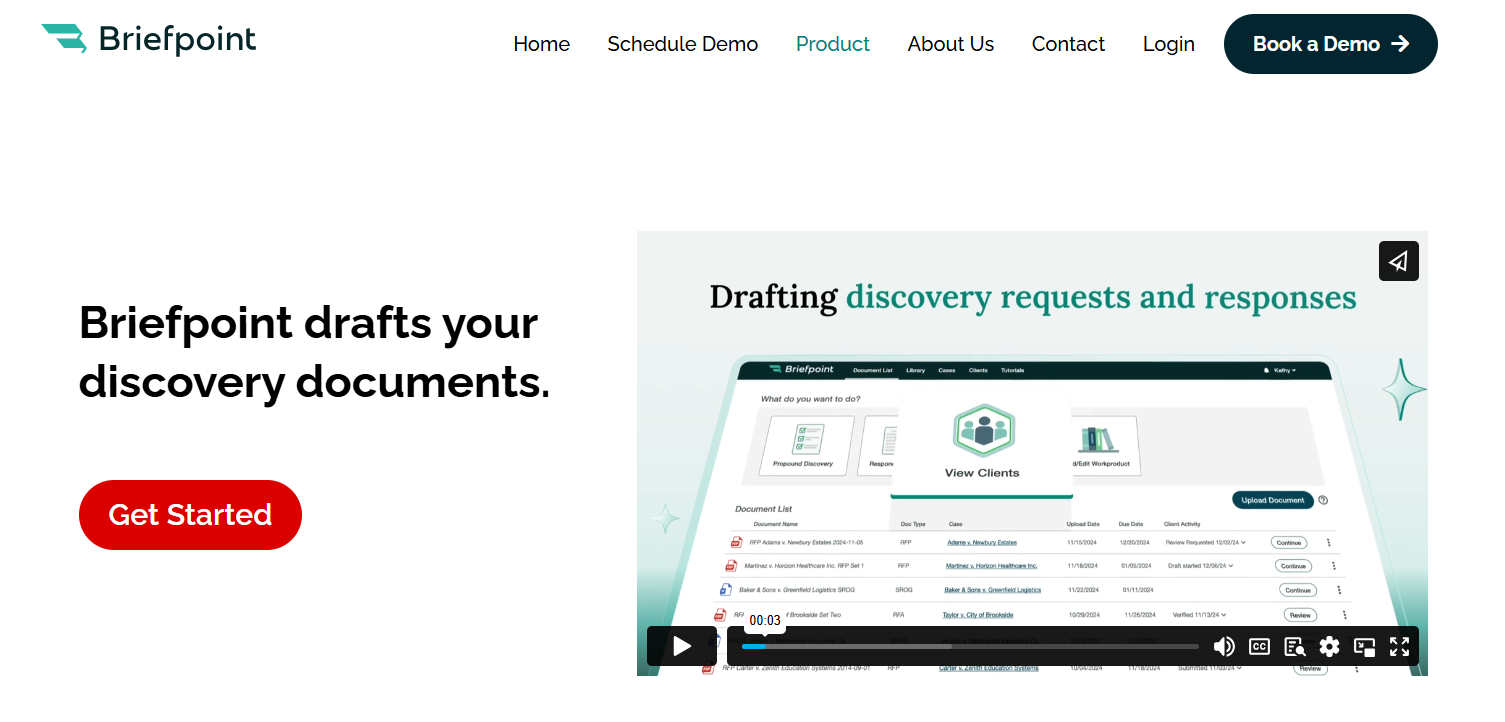
It’s not a general-purpose platform trying to do everything. It’s built for one thing: helping you get through discovery faster, while still aligning with court rules and filing deadlines.
By removing the need to copy and paste from templates, manually format citations, or triple-check procedural rules, Briefpoint gives litigation teams the ability to focus on strategy.
It’s ideal for in-house teams and law firms that want efficiency without sacrificing accuracy or professionalism.
Best Features
- Automated discovery drafting: Generate tailored interrogatories, requests for admission, and requests for production from complaints in under three minutes.
- Jurisdiction-ready formatting: Automatically applies proper formatting, captions, numbering, and instructions for all U.S. states and federal courts.
- Objection-aware language: Uses artificial intelligence to avoid ambiguity, compound questions, assumptions, and overbroad phrasing when propounding or responding.
- Response drafting assistance: Upload opposing counsel’s discovery and generate consistent, defensible responses using firm-standard objections and suggestions.
- Editable and exportable output: Customize drafts, regenerate variants, and export clean Word files ready for review, signature, and service.
- Secure and private platform: SOC 2 certified, HIPAA compliant, and designed to keep sensitive legal data siloed and protected.
Pros
- Purpose-built for the discovery process
- Saves hours of manual drafting and formatting
- Helps reduce the risk of procedural mistakes
- Keeps litigation teams on track with filing deadlines
- Used by hundreds of firms handling high volumes of discovery
- Makes trial preparation more focused and less administrative
- Gives legal professionals a simple, effective way to manage discovery without learning a whole new platform
See how Briefpoint works today.
2. Filevine
Filevine is a legal software platform designed to support litigation teams, especially at larger firms, managing complex cases. It brings together tools for communication, case tracking, and document management on one centralized platform.
Source: G2
With built-in discovery management features, Filevine helps legal teams stay on top of court documents, deadlines, and ongoing communication. It also reduces time spent on administrative tasks by automating intake, task assignments, and progress tracking.
Best Features
- Document management: Store, organize, and access court documents and evidence securely from one place.
- Case progress tracking: Monitor deadlines, assignments, and outcomes across teams and matters.
- Seamless integration: Connects easily with tools like Outlook, Google Drive, and Dropbox to fit into existing workflows.
- Reporting tools: Built-in dashboards provide valuable insights into performance and workloads.
Pros
- Designed for litigation-heavy practices and larger firms
- Handles large volumes of data and files
- Custom workflows help teams adapt to different case types
3. Clio
Clio is an essential tool for litigation teams looking to manage case files, deadlines, and client communications in one place. Designed for legal professionals across practice areas, it helps firms stay organized and responsive throughout the litigation case lifecycle.
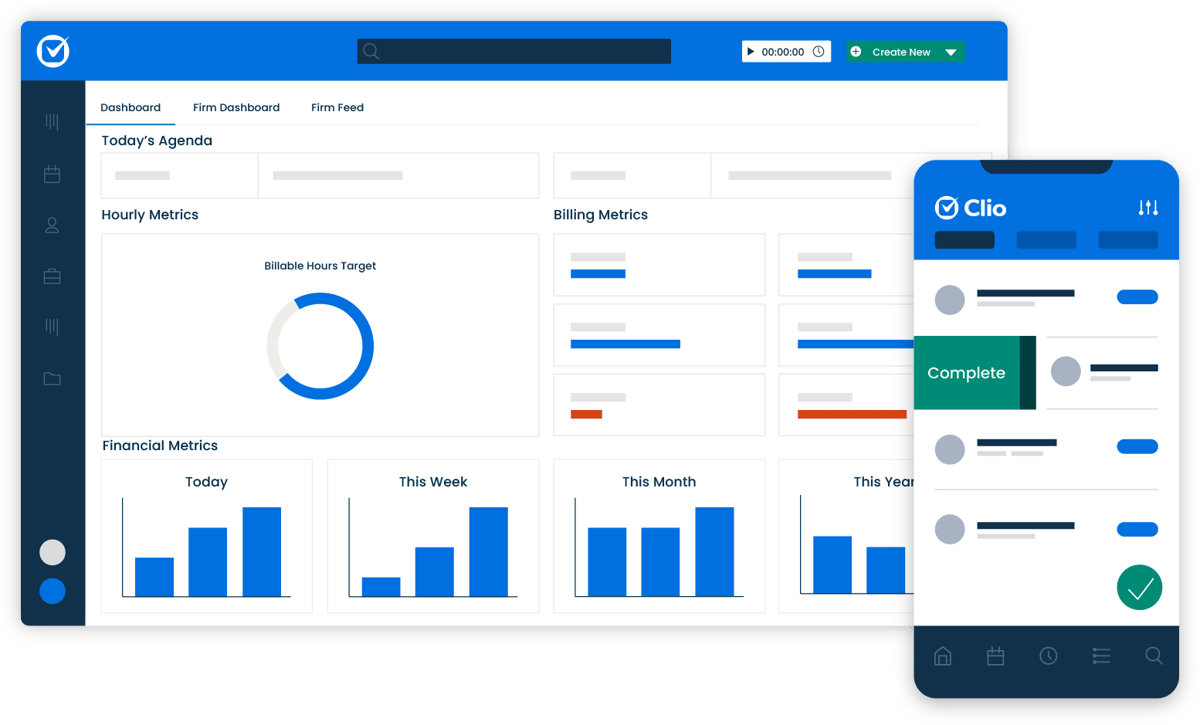
Source: G2
From tracking court dates to managing electronically stored information (ESI), Clio brings together critical details that matter most during litigation. It also offers automated reminders to keep teams aligned on timelines and deliverables.
Best Features
- Case file management: Keep documents, notes, and court records organized and accessible.
- Automated reminders: Reduce the risk of missed court dates or critical deadlines with smart alerts.
- Client communication tools: Secure messaging and client portals help manage conversations and expectations.
- Calendar and task tracking: Visual tools to assign responsibilities and follow litigation workflows.
Pros
- Easy to use and quick to implement
- Cloud-based access for on-the-go litigation teams
- Helps reduce administrative overload with automation
4. Smokeball
Smokeball is a cloud-based legal software designed to help litigation teams streamline daily operations and improve visibility into active matters.
It combines document automation, time tracking, and matter management to deliver greater efficiency without adding to your team’s workload.
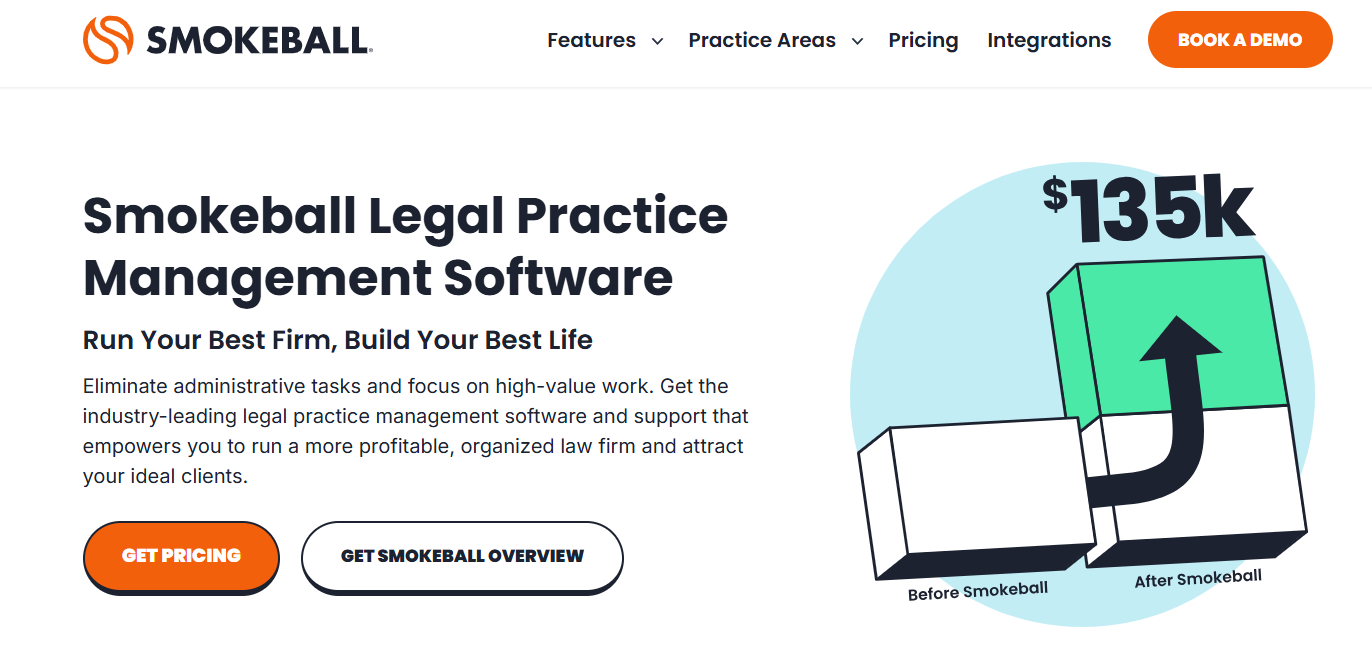
Source: Smokeball.com
With built-in tools to track case progress and manage legal documents securely, Smokeball supports seamless collaboration across staff, even when dealing with sensitive information. Its intuitive interface also helps reduce the learning curve for new users.
Best Features
- Automatic time tracking: Capture time spent on emails, documents, and tasks without manual entry.
- Legal document automation: Create and manage frequently used documents faster using pre-built templates.
- Matter management: Monitor deadlines, communications, and billing activity in one place.
- Expense and legal spend tracking: Get visibility into case-level costs to manage budgets and client reporting.
Pros
- Streamlines repetitive tasks to free up legal teams
- Helps maintain compliance when handling sensitive files
- Built for smaller firms that want legal automation without complexity
5. Lex Machina
Lex Machina is a litigation analytics platform that helps lawyers make smarter, data-driven decisions.
Essentially, it mines millions of court documents to extract key case information, patterns, and outcomes, which can give you a strategic edge when evaluating how to approach a case or assess risk.
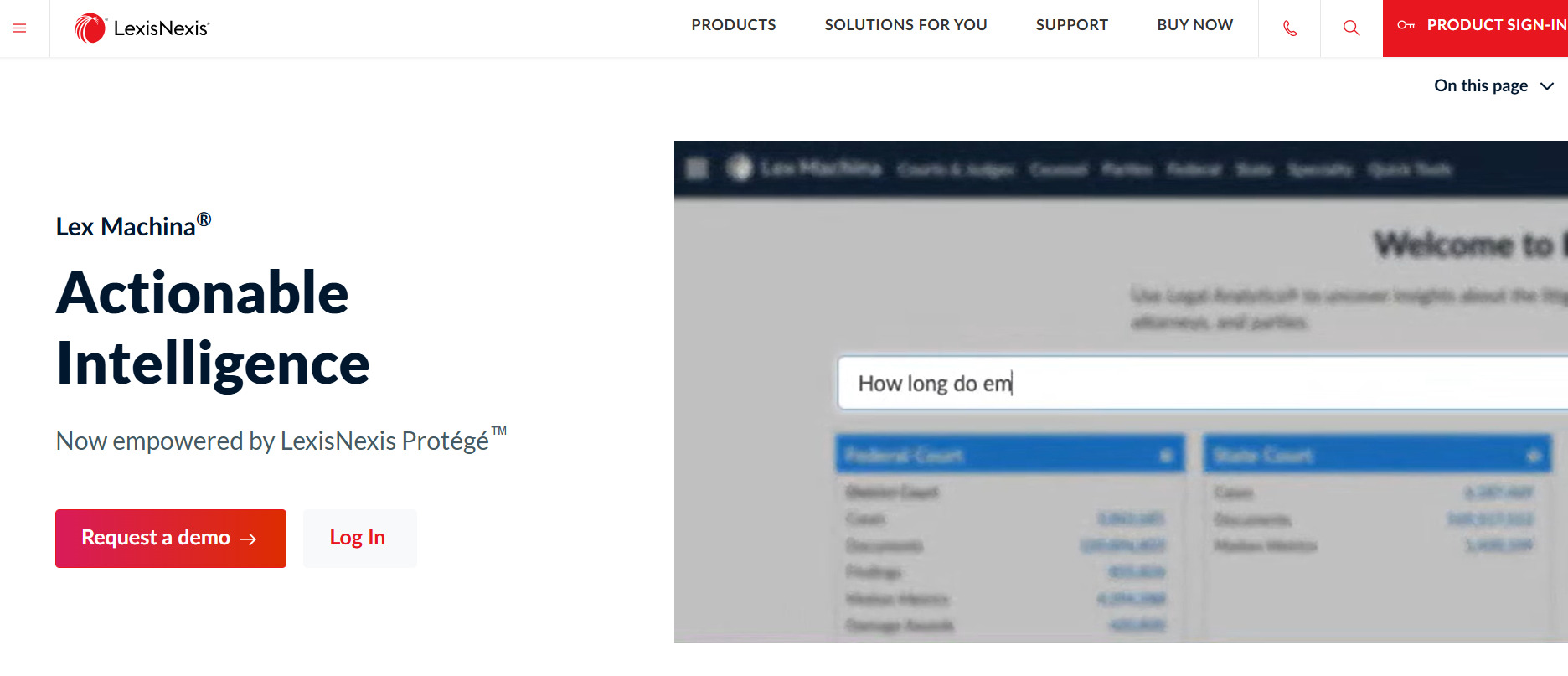
Source: LexisNexis.com
Instead of spending valuable time manually reviewing dockets, legal teams can instantly see how judges have ruled in similar cases, how opposing counsel tends to litigate, and which arguments have historically worked. That means more time for billable work and better preparation across the board.
Best Features
- Analytics for case outcomes: Review win rates, timing, and damages awarded across jurisdictions.
- Judge and opposing counsel profiles: Gain insight into tendencies and litigation history.
- Customizable filters: Zero in on relevant data for specific parties, courts, or case types.
- Visual dashboards: Present complex trends in a clear, easy-to-understand format.
Pros
- Helps lawyers focus efforts where they’re most likely to succeed
- Saves research time and supports a stronger litigation strategy
- Suitable for firms handling complex or high-stakes civil litigation cases
Better Litigation Outcomes Start With Smarter Document Management
When you’re deep into a litigation case, the last thing you need is to waste time repeating the same drafting steps or double-checking formatting rules.
Every minute counts, and so does every document. From tracking deadlines to managing court filings, you need tools that actually help you move things forward.

Briefpoint was built with that in mind. It handles the heavy lifting during discovery, turning complaints into well-structured RFAs, RFPs, and interrogatories in minutes. You stay in control while it takes care of the formatting, phrasing, and local rules.
If discovery still feels like a time sink, it doesn’t have to. Book your Briefpoint demo now and see how much easier litigation management can be.
FAQs About Litigation Management Software
What is the best legal case management software?
The best legal case management software depends on your firm’s size, practice area, and workflow needs. Some attorneys prioritize tools with strong intake process support and document automation, while others look for real-time updates and seamless collaboration tools. Choosing the right litigation management software means identifying a solution that fits your caseload and helps your team stay organized without extra administrative work.
What is legal management software?
Legal management software is a digital platform designed to help attorneys and legal teams handle core tasks such as scheduling, case tracking, document storage, and communications. The key features often include deadline management, client information databases, and collaboration tools that help streamline the litigation workflow from intake to resolution.
What is the most common legal software?
Common legal software includes platforms like Clio, Filevine, and PracticePanther, which cover a wide range of case management needs. These systems offer tools for calendaring, document management, billing, and secure communication, all built to help attorneys save time and reduce risk while managing litigation more efficiently.
Do law firms use case management software?
Yes, most law firms use case management software to centralize files, automate routine tasks, and coordinate across teams. These platforms offer real-time updates, secure access, and features that help attorneys stay focused on legal work without losing track of critical details. Security, scalability, and flexibility are major factors when selecting a solution.
The information provided on this website does not, and is not intended to, constitute legal advice; instead, all information, content, and materials available on this site are for general informational purposes only. Information on this website may not constitute the most up-to-date legal or other information.
This website contains links to other third-party websites. Such links are only for the convenience of the reader, user or browser. Readers of this website should contact their attorney to obtain advice with respect to any particular legal matter. No reader, user, or browser of this site should act or refrain from acting on the basis of information on this site without first seeking legal advice from counsel in the relevant jurisdiction. Only your individual attorney can provide assurances that the information contained herein – and your interpretation of it – is applicable or appropriate to your particular situation. Use of, and access to, this website or any of the links or resources contained within the site do not create an attorney-client relationship between the reader, user, or browser and website authors, contributors, contributing law firms, or committee members and their respective employers.